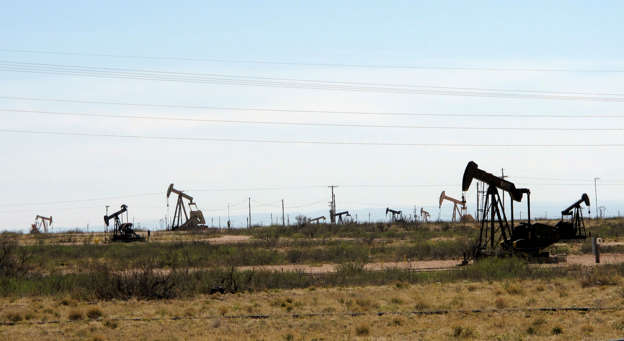So much of the Permian Basin is under production that the lights glowing at night, on well pads and rigs and double-wide trailers, make the place look in NASA satellite photos like a giant Lite Brite. But there’s a spot where the Permian dims.

© Jeri Clausing/AP Photo
It’s a big one, covering more than 250 square miles and loaded with enough oil and gas that it could, by some estimates, fetch $7 billion. In an era where everything in the basin seems to be for sale, though, the Fasken ranch isn’t. The owners have no interest. They don’t even want to drill very much.
That’s heresy in the busiest U.S. oil patch, and almost as much of a curiosity as the lack of enthusiasm for cashing in. “As long as I have been alive, I have never known anyone to successfully negotiate any type of purchase from them,” said Kimberly Wurtz, a lawyer in Norman, Oklahoma, who grew up near the ranch in the 1980s and ’90s.
Back in 1913, when Toronto attorney David Fasken paid $1.50 an acre for plains outside Midland, the plan, according to lore, was to make a fortune raising cattle. There was too little water for that to happen. Fasken died 16 years later, unaware of the riches below the surface.
Now his heirs are among the 100 families that are the biggest private landowners in the U.S.—No. 40 on the list in terms of acreage, and nearer the top in value. Their holdings include three ranches in South Texas and commercial, industrial and residential real estate scattered around the Lone Star State and California. There’s also a vineyard in Napa Valley.
These scions are members of the old guard in the top 100, beneficiaries of parcels that were passed down and appreciated, with businesses in agriculture or energy or real estate often spinning off new layers of wealth.
Choice in the Fasken portfolio are the 165,000 acres in the Permian, a sedimentary basin of oil-steeped rock in West Texas and southeast New Mexico that produces more crude than every OPEC member except Saudi Arabia and Iraq.
Big oil has plans to pump out even more. Companies have been taking over acreage and operations that had been in private hands for generations. Two years ago, Exxon Mobil Corp. bought the land of the Bass family of Dallas for $6 billion. The next to go may be Endeavor Energy Resources LP, owned by Autry Stephens and his relations, which has been in talks to sell to Royal Dutch Shell Plc for more than $10 billion.
Then there’s the holdout, Fasken Oil & Ranch Ltd., still seemingly bound by the fading West Texas ethic that ruled in the days when ranches were handed from generation to generation, with the dictum of “Never sell the minerals” as guidance. “They’re one of the very rare owners that never severed their minerals and surface rights,” Wurtz said.
The company is owned by descendants of Barbara Fasken, who wed a grandson of David Fasken and brought children from a previous marriage into the family. Her son Robert Dickson, who died in March, inherited 50% of her fortune, and two grandsons each have 25%. Family members didn’t respond to requests for comment.
“The family’s never had any gumption at all to sell,” said Jimmy Davis, who runs the Fasken operations.
This reluctance fits with the strange way, by local standards, the heirs do things. Instead of shipping in fresh water for the drilling process, the company uses mostly recycled or nonpotable H₂0. While the recent boom in Permian production has come from drilling mile-long horizontal wells, Fasken instead mostly sticks with the old-school vertical version.
Much of America’s shale boom of the past decade has been financed with debt; the company has none. What’s more, the Fasken acreage is lightly drilled because, as Davis explained, the family wants to go slow and preserve the mineral base. What’s the rush?
Now, as Davis said, “everything’s for sale at the right price.” He has no guess what that might be for the family. It hasn’t yet emerged even with some Permian acres going for more than $70,000.
He has a roundabout way of explaining the situation. “I’ve always been able to say to folks that I’ve hired here: ‘I can’t guarantee that we’ll never sell, but I can guarantee that we’ll be the ones to turn the lights off on the way out.’”
–With assistance from Javier Blas and Devon Pendleton.
Tags: Fasken portfolio, Fasken ranch, Permian basin, shale, South Texas, U.S. oil patch
 Oxstones Investment Club™
Oxstones Investment Club™